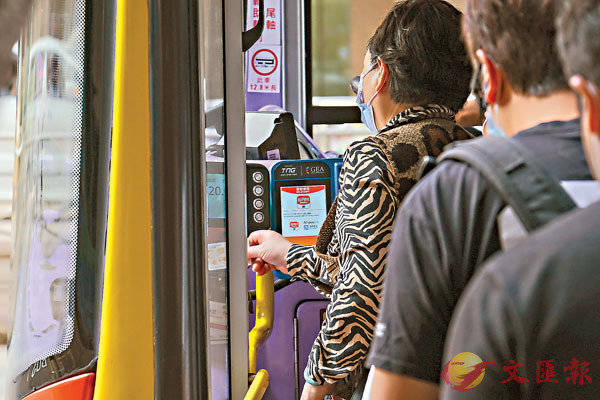 ● 行政會議批准巴士公司加價。 資料圖片
● 行政會議批准巴士公司加價。 資料圖片【原文】本港最新失業率升至7.2%的17年高位,但與此同時,行政會議一口氣批准4家巴士公司下月起加價,平均加幅高達8.5%至12%,為自2006年政府引入專營巴士可加可減票價機制以來批准加幅最高的一次。本港經濟受疫情重創,失業率高處未算高,巴士是本港重要的公共交通服務,今次巴士加價非常不合時宜,對低收入打工仔影響尤其大。艱難時刻,無論是巴士公司還是政府,首先要考慮照顧基層的社會責任,希望政府綜合考慮現時的經濟社會實況,與巴士公司商討暫緩加價,避免造成政府向大企業傾斜、漠視基層疾苦的觀感。
在經濟前景晦暗不明的情況下,多家巴士公司獲批大幅加價,公眾難以接受。按照此次8.5%至12%的加幅,居住在大嶼山的基層市民,每日要多付出十元八塊的車費,一個月就要多支出兩三百元,無疑是百上加斤。雖然政府同時將公共交通費用補貼計劃的補貼上限由400元提升至500元,並延長6個月至年底,但相關補貼機制是市民累積搭車費用超過200元後才補貼三分之一,所以無論如何補貼,巴士公司加價後,市民實際付出的交通成本還是會增加。
巴士公司的加價申請,在2018至2019年已經提出,但由於本港經濟環境轉差,加上政府推出兩輪保就業計劃等補貼措施,加價計劃一直擱置。保就業計劃去年底完結後,政府考慮到乘客量下跌、成本上升等因素,批准巴士加價,更指巴士即使加價後仍會虧損。
這個加價理由看似合理,但眼前經濟、就業環境極之惡劣,各行各業艱苦支撐,基層打工仔收入銳減,且不少基層打工仔因負擔能力所限,只能居於租金較便宜的偏遠地區,巴士是他們最主要的交通工具。 巴士公司以經營困難為由大幅加價,難免予人只顧自己、不體恤市民的印象。
根據現行的巴士票價調整機制,主要考慮運輸業名義工資指數變動、綜合消費物價指數變動和生產力增幅3個因素。社會長期強烈呼籲,政府在考慮加價申請時,必須考慮市民的負擔能力。此次巴士大幅加價,顯然反映巴士票價調整機制與社會經濟、就業情況脫節。
自保就業計劃在去年底完結以來,本港失業率和就業不足率就持續上升,即使保住飯碗的市民,也面臨減薪或凍薪的困境。政府一直未回應社會要求推出臨時失業援助金的訴求,卻批准巴士大幅加價,厚此薄彼,恐怕社會難以承受。希望政府更多從基層市民利益考慮,暫緩巴士加價。 ( 摘錄自香港《文匯報》社評 2021-3-17)
Bus fare raise is untimely and should be shelved
【譯文】The latest unemployment rate in Hong Kong rose to a 17-year high of 7.2 per cent, yet at the same time, the Executive Council has just approved all four bus fare increase applications that would become effective starting from next month. Ranging from 8.5 to 12 per cent, this would be the steepest price hike yet since the fare adjustment mechanism for franchised buses was introduced back in 2006. Buses play a crucial role in Hong Kong's public transport system, and are a very important means of transport to the grassroots. As the unemployment rate is sky high and Hong Kong's economy is still battered by the Covid-19 pandemic, this is probably the worst moment to increase bus fares. It does not matter if it is a bus company or the government that one is running, the first priority for decision-makers in such difficult times should be shouldering their social responsibility and taking care of the grassroots. It is hoped that the government would take into account the socio-economic reality at present, and discuss with the bus companies the possibility of suspending the fare raise. Otherwise, it would give a perception that the government is leaning towards big enterprises and ignoring the suffering of the grassroots people.
At a time when the economic outlook is gloomy, the public could hardly find it acceptable for the government to approve multiple bus fare raises. With the new 8.5 to 12 per cent price hike, a grassroots worker who lives in Lantau Island will have to pay an extra fare per trip, which is HK$200-300 more over a month.
While the government also extended its public transport fare subsidy scheme for six months till 31 December 2021 and increased the subsidies cap by HK$100 to HK$500 per month, it only covers one-third of monthly public transport expenses that are over HK$200. This means despite the government's subsidies, the public's transportation costs will still increase.
The bus companies have reportedly filed their applications in 2018-2019 already. However, due to the deteriorating economic environment of Hong Kong, the government has been focusing on new subsidy programs such as the two tranches of the employment support scheme, and the fare spike proposals have been shelved ever since. As the employment support scheme has ended in late 2020, the government has now decided to approve the bus fare raises in consideration of factors such as falling passenger numbers and rising operating costs. The authorities also pointed out that the bus companies are still going to be in the red even after the fare hike.
At first glance, these seem to be fair reasons to back the bus companies' price hikes. But in reality, the situation is looking dire for both the economy and the job market, all the other sectors and their workers are facing the same troubles. Moreover, many grassroots workers can only live in remote areas with cheaper rents, and buses are their primary means of transportation. Increasing fares sharply due to "operating difficulties" would only give the impression of selfishness and indifference to the general public.
Currently, the fare adjustment mechanism for buses mainly takes into account changes in the nominal wage index of the transportation sector, the composite consumer price index, as well as increase in productivity. The society has long urged that the government must consider the affordability of the public when considering fare increase applications.
The steep fare hike at this time reflects the disconnection between the bus fare adjustment mechanism and both the socio-economic reality and the employment situation.
The unemployment rate and underemployment rate in Hong Kong have continued to rise following the cessation of the employment support scheme in late 2020. Even people who kept their jobs are now facing wage cuts or wage freezes.
The public could hardly find it acceptable that the government has given green light for fare hikes, but has still not yet responded to their cry for temporary unemployment assistance. It is hoped that the government will care for the interests of the grassroots more and postpone the increase in bus fares.●Jeffrey Tse
Exercise
1. 專營巴士
2. 九巴
3. 城巴
4. 新巴
5. 新大嶼山巴士
Answer
1. franchised buses
2. Kowloon Motor Bus
3. Citybus
4. New World First Bus
5. New Lantao Bus

